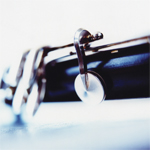
François Houle
Aerials
(Drip Audio; 2006)
By Mark Abraham | 3 November 2006
I’m a sucker for clarinet, in part because I play (or, given the time I can actually devote to practicing the thing given my apartment’s paper thin walls, my temperamental house mates, and my inability to sequester it through headphones like everything else in my studio, “play”) one, and in part because that mournful, reedy tone sounds like pure, acoustic sound. It’s really the only instrument I get weak-kneed enough about to let modifiers like “pure” or “authentic” slip—I hate those ideas when they’re normally employed against the blues or folk, so why am I suddenly slack-jawed and gibbering over the instrument that is basically next in line to the recorder as the most played instrument in band because of its relatively inexpensive price compared to its more flashier cousins in the brass section? I have no good answer here. As far as I know, the clarinet isn’t a super-popular instrument in Lebanon, so “cosmic heritage pinging” is out—but when I hear a clarinet played well, I go berserk.
Aerials, then, which is mostly solo clarinet, is like a brochure for the instrument: here are all the things a clarinet can do, awesomely, and whether you’re sitting out back on the stoop on a reasonably mild Toronto day or walking down a super-windy Sheridan on a not-so-mild Chicago day, the noises here just mold themselves to your activity. Or maybe that’s just me, given the fetish, but it’s like a soundtrack to my subconscious: bleeps and werps and bip-beeps that connect like a nerve system, and at the end of each extremity is a little tingle. Houle is running though emotions like a recycling machine—we can be here, or here, or even over here, but in between there are vast caverns of things left unsaid. Here, the clarinet is saying them, knocking them up into the routing functions of aerials everywhere, sending these ideas from car to radio to satellite dish to that remote control car you had as a kid, because the transmission of radio waves is simultaneously about knowledge and pleasure. Knowledge: the tactile sense of an instrument. Pleasure: how it sounds.
Aerials, then, which is mostly solo clarinet, is like a brochure for the instrument: here are all the things a clarinet can do, awesomely, and whether you’re sitting out back on the stoop on a reasonably mild Toronto day or walking down a super-windy Sheridan on a not-so-mild Chicago day, the noises here just mold themselves to your activity. Or maybe that’s just me, given the fetish, but it’s like a soundtrack to my subconscious: bleeps and werps and bip-beeps that connect like a nerve system, and at the end of each extremity is a little tingle. Houle is running though emotions like a recycling machine—we can be here, or here, or even over here, but in between there are vast caverns of things left unsaid. Here, the clarinet is saying them, knocking them up into the routing functions of aerials everywhere, sending these ideas from car to radio to satellite dish to that remote control car you had as a kid, because the transmission of radio waves is simultaneously about knowledge and pleasure. Knowledge: the tactile sense of an instrument. Pleasure: how it sounds.
And it sounds really good. Houle is masterful; he swoops and yawns before dropping into snarky little doo-op horn pastiches; he’ll run incredibly out before dissolving into a pristine melody; he’ll droop and sigh mournfully before cracking the punch line to his joke. It’s a fantastic mish-mash of ideas that are constantly feeding off one another, and while the disc is obviously limited by what it is—one musician working out on a clarinet for an extended period of time—sometimes those albums are the only ones where we can work through the bottom of our subconscious and out the other side to something even better, where clarinets gain new purpose in life. At the same time, isn’t it just fun, sometimes, to hear a fabulous musician go without wanking all over you? ‘Cause Houle has got a gift, but he’s not trying to make you feel it; he’s just hoping you get the map he’s drawing to another plane of music entirel





